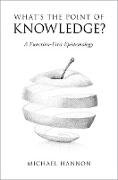This book is about knowledge and its value. At its heart is a straightforward idea: we can answer many interesting and difficult questions in epistemology by reflecting on the role of epistemic evaluation in human life. Michael Hannon calls this approach function-first epistemology. To Hannon, the concept of knowledge is used to identify reliable informants; this practice is necessary, or at least deeply important, because it plays a vital role in human survival, cooperation, and flourishing. Though a seemingly simple idea, function-first epistemology has wide-reaching implications. From this premise, Hannon casts new light on the very nature and value of knowledge, the differences between knowledge and understanding, the relationship between knowledge, assertion, and practical reasoning, and the semantics of knowledge claims. This book forges new paths into some classic philosophical puzzles, including the Gettier problem, epistemic relativism, and philosophical skepticism. What's the Point of Knowledge? shows that pivotal issues in epistemology can be resolved by taking a function-first approach, demonstrating the significant role that this method can play in contemporary philosophy.


